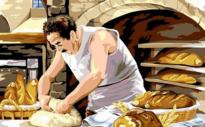L' histoire de Metz et de la Lorraine, histoire de la moselle - cartes postales anciennes de Metz - cartes postales anciennes de Moselle - histoire Moselle

Maison N°16, Rue Taison
Mr GEORGES François, a baker by his trade, practised his art at number 16, rue Taison, in 1809.
As bread-making and bread-baking is a domestic activity at the time of the Gallic, it is only under Charlemagne that the first bakeries make their appearance. Right since 1260, the talemelier-boulanger profession is governed by statutes deciding upon the working days, the price, the quality or the weight
of the breads. (Boulanger is the current French term for baker, and talemelier is an archaic French word referring to the ancestor of the pastry chef)
It is said that the use of bread was introduced in Gaul by the Phocaean.
But, as long as the usual practice was to cook bread under the ashes, each mother was able to carry out this domestic work, and there were no bakers. However, when the use of the oven was adopted, as it created more expenditure and encumbering, one found more convenient to buy bread to the baker.
In order to become a master and gain the right to practice his profession, the baker had to follow a four-year-long apprenticeship, buy his diploma to the king, or to his intermediary, the grand panetier (person ruling the supply of the bread), and then, for his reception, comply with certain strange formalities, whose mysterious meaning completely escapes us nowadays.
Thus, the new master must present himself to the house of the community head, where the receiver of the rights, all the
master-bakers of the town and their geindres (their elder sons) are already gathered; and the new baker must hand his pot and his walnuts to the master (the head of the community) and say: Master, I did my four years. And the master must ask the coutumier (the receiver of the rights) if it is true; and if it is, the master must give the new baker his pot and his walnuts, and order him to throw them against the wall. While he is throwing them, the master and his assistants remain outside of the house; then they go indoor, where the head must make deliver some fire and wine; and all the talemeniers, and the new one, and the master-servants owe one denier each to the master, in payment for the fire and the wine he makes deliver.
Right from that time, the right of inspection was established, and the bread whose weight was insufficient was confiscated for the poor; each infraction was judged by the master of the community; the appeals were brought to the grand panetier, whose judgement could not be subject to appeal. The penalty was very simple: each fault was punished with a six-denier fine.


